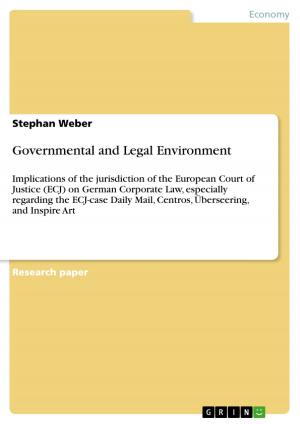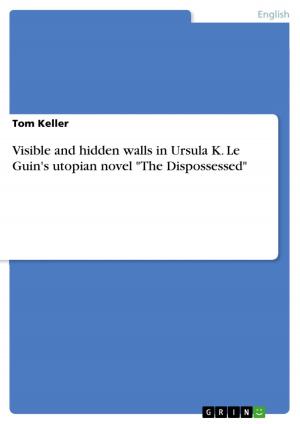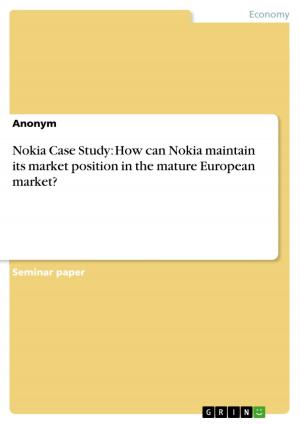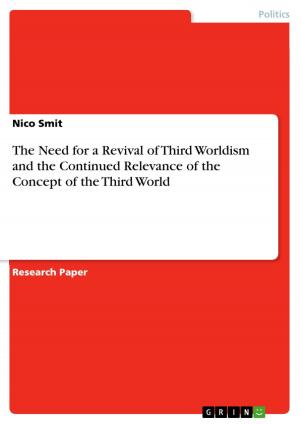Metafictional Aspects in Novels by Muriel Spark
Fiction & Literature, Literary Theory & Criticism, British| Author: | Gesa Giesing | ISBN: | 9783638303460 |
| Publisher: | GRIN Publishing | Publication: | August 30, 2004 |
| Imprint: | GRIN Publishing | Language: | English |
| Author: | Gesa Giesing |
| ISBN: | 9783638303460 |
| Publisher: | GRIN Publishing |
| Publication: | August 30, 2004 |
| Imprint: | GRIN Publishing |
| Language: | English |
Examination Thesis from the year 2002 in the subject English Language and Literature Studies - Literature, grade: 1,0 (A), University of Leipzig (Institute for Anglistics), language: English, abstract: ANYTHING WRITTEN IN ENGLISH IS A LIE Anything written in English is a lie. This is by no means a new idea, with many people having given thought and expression to it (recently and rather extensively so, for instance, Jeanette Winterson). One way to handle this sentence is to relate it to the idea that something written can never be reality. That then, though, some things written (or only fictional texts?; or even fictional texts?; or anything produced?) might have a reality of their own, and that finally these realities might be part of another, larger and encompassing reality - they might. There need not be such a larger idea beyond things. All novelists have been faced with the question of how to deal with this multilayered reality, novels that deal with it explicitly being called metafictional novels. Metafictional literature has come up with innumerable ways of handling and playing with the notion of what is being real and what fictitious. Anything written in English is a lie. This sentence is also putting into other words the famous paradox of the Cretan stating that all Cretans are liars. For with both, as with many other paradoxes, the paradox is a result of the statement's self-reference. Since the statement is written in English, it denies its own truth, which it actually does not if it is a lie - it would stop being a lie then, though. Any attempt to solve the paradox will end in moving in circles. The only way not to go insane when trying to find a solution is to accept that the sentence is made up and that it cannot be true in terms of our familiar logic. Once we view it as artificial, as something that has been made up to be not solvable (which need not be the case), we adopt another perspective and for instance allow ourselves to be entertained by contemplating paradoxes. Confronted with any paradoxical or otherwise inexplicable situation human beings still feel an urge to ascribe explanations and reasons to it and often turn to religion, commonplace theories or superstition to find them. Religions explain how the Earth came into existence. If we drop a cup or spill hot milk, it happened because our boss was being a strain. If we got an unjustified salary rise, the stars would have favoured us. A religious woman might regard it as God's punishment when she falls in love with her husband's lover. Seldom are we at a loss for an explanation which we may well believe in but which cannot be proved to be causative...
Examination Thesis from the year 2002 in the subject English Language and Literature Studies - Literature, grade: 1,0 (A), University of Leipzig (Institute for Anglistics), language: English, abstract: ANYTHING WRITTEN IN ENGLISH IS A LIE Anything written in English is a lie. This is by no means a new idea, with many people having given thought and expression to it (recently and rather extensively so, for instance, Jeanette Winterson). One way to handle this sentence is to relate it to the idea that something written can never be reality. That then, though, some things written (or only fictional texts?; or even fictional texts?; or anything produced?) might have a reality of their own, and that finally these realities might be part of another, larger and encompassing reality - they might. There need not be such a larger idea beyond things. All novelists have been faced with the question of how to deal with this multilayered reality, novels that deal with it explicitly being called metafictional novels. Metafictional literature has come up with innumerable ways of handling and playing with the notion of what is being real and what fictitious. Anything written in English is a lie. This sentence is also putting into other words the famous paradox of the Cretan stating that all Cretans are liars. For with both, as with many other paradoxes, the paradox is a result of the statement's self-reference. Since the statement is written in English, it denies its own truth, which it actually does not if it is a lie - it would stop being a lie then, though. Any attempt to solve the paradox will end in moving in circles. The only way not to go insane when trying to find a solution is to accept that the sentence is made up and that it cannot be true in terms of our familiar logic. Once we view it as artificial, as something that has been made up to be not solvable (which need not be the case), we adopt another perspective and for instance allow ourselves to be entertained by contemplating paradoxes. Confronted with any paradoxical or otherwise inexplicable situation human beings still feel an urge to ascribe explanations and reasons to it and often turn to religion, commonplace theories or superstition to find them. Religions explain how the Earth came into existence. If we drop a cup or spill hot milk, it happened because our boss was being a strain. If we got an unjustified salary rise, the stars would have favoured us. A religious woman might regard it as God's punishment when she falls in love with her husband's lover. Seldom are we at a loss for an explanation which we may well believe in but which cannot be proved to be causative...















